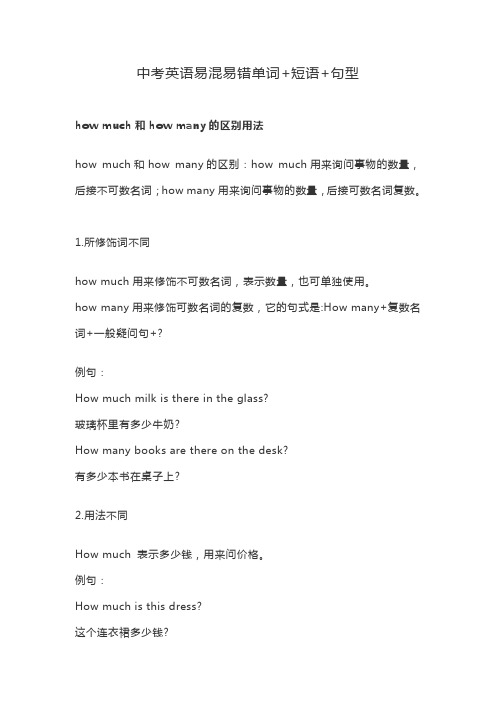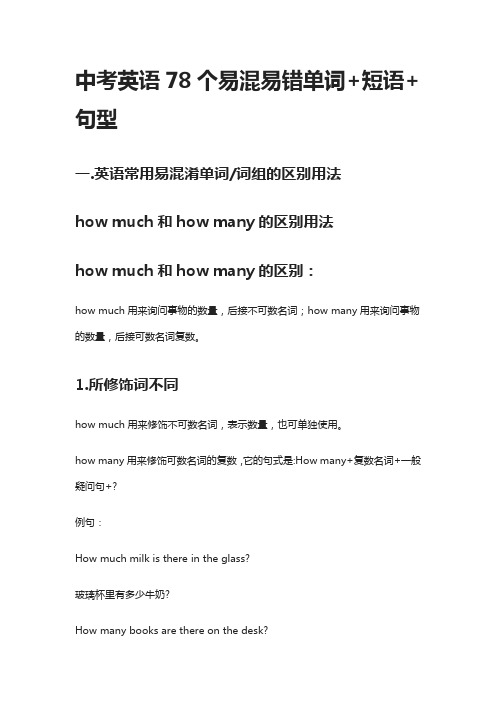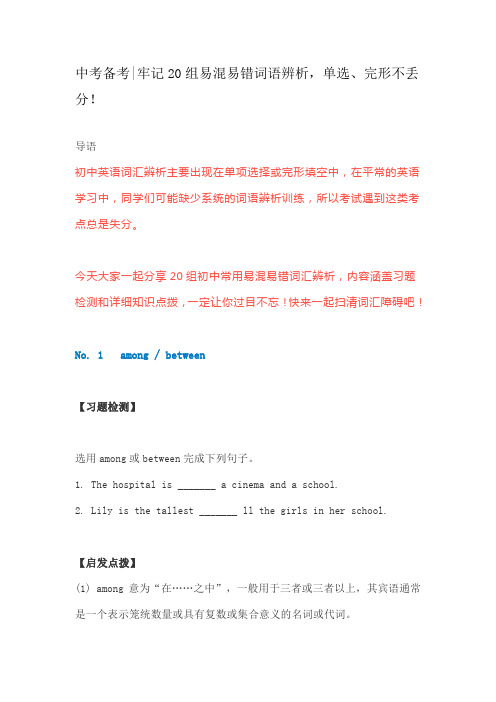中考英语易混词汇总结
中考英语常用易混淆单词词组的区别用法详解

中考英语易混易错单词+短语+句型how much和how many的区别用法how much和how many的区别:how much用来询问事物的数量,后接不可数名词;how many用来询问事物的数量,后接可数名词复数。
1.所修饰词不同how much用来修饰不可数名词,表示数量,也可单独使用。
how many用来修饰可数名词的复数,它的句式是:How many+复数名词+一般疑问句+?例句:How much milk is there in the glass?玻璃杯里有多少牛奶?How many books are there on the desk?有多少本书在桌子上?2.用法不同How much 表示多少钱,用来问价格。
例句:How much is this dress?这个连衣裙多少钱?How many 表示多少,用来问数量。
例句:How many apples do you have?你有多少苹果?in和on的区别用法当我们表示某些东西被其他东西所包围时使用“in”这个词。
而“on”用于描述物体被放置在其他物体上方或外部的情况。
in可表时间,表地点,表手段、方法、材料。
on表示时间、地点、方位等。
1.意思不同in:prep.在... 里;在... 地方;在... 期间on:prep.在... 之上2.用法不同in:in着重一段时间的过程,常用于重复动作或延续动作。
in表示从现在时间算起推移到将来的一段时间之后,一般与将来时态连用。
例句:He is a layman in economics.他对经济学一窍不通。
on:表示“在物体的表面上”,只能用on的表达方式有on the next morning,on the following。
例句:The spider is walking on the ceiling.蜘蛛在天花板上爬行。
3.侧重点不同in:表示“在其中”。
on:表示“在表面”。
中考英语78个易混易错单词+短语+句型(全)

中考英语78个易混易错单词+短语+句型一.英语常用易混淆单词/词组的区别用法how much和how many的区别用法how much和how many的区别:how much用来询问事物的数量,后接不可数名词;how many用来询问事物的数量,后接可数名词复数。
1.所修饰词不同how much用来修饰不可数名词,表示数量,也可单独使用。
how many用来修饰可数名词的复数,它的句式是:How many+复数名词+一般疑问句+?例句:How much milk is there in the glass?玻璃杯里有多少牛奶?How many books are there on the desk?有多少本书在桌子上?2.用法不同How much 表示多少钱,用来问价格。
例句:How much is this dress?这个连衣裙多少钱?How many 表示多少,用来问数量。
例句:How many apples do you have?你有多少苹果?in和on的区别用法:当我们表示某些东西被其他东西所包围时使用“in”这个词。
而“on”用于描述物体被放置在其他物体上方或外部的情况。
in可表时间,表地点,表手段、方法、材料。
on表示时间、地点、方位等。
1.意思不同in:prep.在 ... 里;在 ... 地方;在 ... 期间on:prep.在 ... 之上2.用法不同in:in着重一段时间的过程,常用于重复动作或延续动作。
in表示从现在时间算起推移到将来的一段时间之后,一般与将来时态连用。
He is a layman in economics.他对经济学一窍不通。
on:表示“在物体的表面上”,只能用on的表达方式有on the next morning,on the following。
The spider is walking on the ceiling.蜘蛛在天花板上爬行。
3.侧重点不同in:表示“在其中”。
英语中考牢记20组易混易错词语辨析

中考备考|牢记20组易混易错词语辨析,单选、完形不丢分!导语初中英语词汇辨析主要出现在单项选择或完形填空中,在平常的英语学习中,同学们可能缺少系统的词语辨析训练,所以考试遇到这类考点总是失分。
今天大家一起分享20组初中常用易混易错词汇辨析,内容涵盖习题检测和详细知识点拨,一定让你过目不忘!快来一起扫清词汇障碍吧!No. 1 among / between【习题检测】选用among或between完成下列句子。
1. The hospital is _______ a cinema and a school.2. Lily is the tallest _______ ll the girls in her school.【启发点拨】(1) among意为“在……之中”,一般用于三者或三者以上,其宾语通常是一个表示笼统数量或具有复数或集合意义的名词或代词。
(2) between一般指两者之间,其宾语通常是表示两者概念的名词或代词,或由and连接的两个具体的人或物。
between有时也可表示多者之中的“两两之间”。
如:Switzerland lies between France, Germany, Austria and Italy.Key:1. between2. amongNo. 2 lay / lie【习题检测】用lay或lie的适当形式完成句子。
1. I _______ the table when my mother cooked the meal.2. John was ill and _______ in bed all morning.【启发点拨】(1) lay作动词,可意为“摆放(餐桌)”,其过去式与过去分词均为laid,现在分词为laying,常用于短语lay the table,意为“摆放餐桌”。
如:Tom was laying the table.(2) lie作动词,意为“躺;平躺”时,过去式为lay,过去分词为lain,现在分词为lying。
中考英语最易混淆词汇汇总

中考英语最易混淆词汇汇总1. clothes, cloth, clothingclothes统指各种衣服,谓语动词永远是复数, cloth指布,为不可数名词clothing 服装的总称,指一件衣服用a piece of, an article of2. incident, accidentincident指小事件, accident指不幸的事故He was killed in the accident.3. amount, numberamount后接不可数名词, number后接可数名词 a number of students4. family, house, homehome 家,包括住处和家人,house房子,住宅,family家庭成员. My family is a happy one.5. sound, voice, noisesound自然界各种各样的声音,voice人的嗓音,noise噪音I hate the loud noise sutside.6. photo, picture, drawingphoto用照相机拍摄的照片,picture可指相片,图片,电影片,drawing画的画Let's go and see a goodpicture.7. vocabulary, wordvocabulary词汇,一个人拥有的单词量,word具体的单词He has a large vocabulary.8. population, peoplepopulation人口,人数,people具体的人 China has a large population.9. weather, climateweather一天内具体的天气状况,climate长期的气候状况The climate here is not good for you.10. road, street, path, wayroad具体的公路,马路,street街道,path小路,小径, way道路,途径take this road; in the street, show me the way to the museum.11. course, subjectcourse课程(可包括多门科目),subject科目(具体的学科)a summer course12. custom, habitcustom传统风俗,习俗,也可指生活习惯,后接to do, habit生活习惯,习惯成自然,后接of doing. I've got the habit ofdrinking a lot.13. cause, reasoncause 指造成某一事实或现象的直接原因,后接ofsth./doing sth,reason用来解释某种现象或结果的理由,后接for sth./doing sth. the reason for being late14. exercise, exercises, practiceexercise运动,锻炼(不可数),exercises练习(可数), practice(反复做的)练习 Practice makesperfect.15. class, lesson作"课"解时,两者可以替换.指课文用lesson. 指班级或全体学生用class. lesson 6; class 516. speech, talk, lecturespeech指在公共场所所做的经过准备的较正式的演说,talk日常生活中的一般的谈话,讲话,lecture学术性的演讲, 讲课 a series of lecture on…17. officer, officialofficer部队的军官,official政府官员 an armyofficer18. work, job二者均指工作。
中考英语必背知识点

中考英语必背知识点一、词汇类。
1. 单词拼写。
- 不规则动词的过去式和过去分词,如:go - went - gone;see - saw - seen;do - did - done等。
这些在写作和语法填空等题型中经常用到。
- 形容词和副词的比较级和最高级的不规则变化,如:good/well - better - best;bad/badly - worse - worst;many/much - more - most。
2. 词汇辨析。
- 易混单词,如:- affect(动词,影响)和effect(名词,影响;动词,产生,引起)。
例如:The bad weather affected his mood.(天气不好影响了他的心情。
)The new law will have a great effect on the environment.(新法律将对环境有很大影响。
)- borrow(借入)和lend(借出)。
例如:I borrowed a book from the library.(我从图书馆借了一本书。
)He lent me his pen.(他把他的钢笔借给我了。
)- 近义词辨析,如:- say, speak, talk和tell的区别。
say强调说话的内容,如:He said he was happy. speak主要指说某种语言或在正式场合发言,如:He can speak English. talk强调交谈,常用于talk to/with sb. about sth.结构,如:They are talking about their plans. tell表示告诉,常用于tell sb. sth.或tell sth. to sb.结构,如:She told me a story.二、语法类。
1. 时态。
- 一般现在时。
- 表示经常或习惯性的动作或状态,常与often, usually, always, sometimes 等频率副词连用。
中考英语语法易错易混知识点

中考英语语法易错易混知识点一、可数名词与不可数名词1.可数名词表示能够用数目表示的名词,常常可以用单数或复数形式来表示,其前可以加"a"或"an"。
例句:I have a book.(单数)/ I have two books.(复数)2.不可数名词表示不能用数目清楚地表示的名词,只能用单数形式,前面不能加"a"或"an"。
例句:I have some milk.(不可数名词)二、形容词与副词1.形容词修饰名词,用来描述或限定名词。
形容词通常放在名词的前面。
例句:She is a beautiful girl.2.副词用来修饰动词、形容词或其他副词,通常放在被修饰词的后面。
例句:He runs fast.三、一般现在时与现在进行时1.一般现在时表示经常性或习惯性的动作,叙述真理或客观事实。
例句:The sun rises in the east.(真理)/ He often plays soccer on weekends.(习惯性动作)2.现在进行时表示现在正在进行的动作。
例句:I am watching TV now.(正在进行的动作)四、一般过去时与过去进行时1.一般过去时表示已经结束的过去的动作。
例句:I finished my homework yesterday.(过去的动作已经完成)2.过去进行时表示过去其中一时刻正在进行的动作。
例句:They were playing basketball at 7 o'clock yesterday evening.(过去其中一时刻正在进行的动作)五、定冠词与不定冠词1.定冠词"the"用来特指已经提到过或可唯一确定的名词。
例句:I saw the boy in the park.(特指已经提到的男孩)2.不定冠词"a"或"an"用来表示泛指或不特指的名词。
中考英语词汇部分专题讲解:中考英语易混词汇辨析

中考英语易混词汇辨析及练习above/over/on词汇用法例句above “在……上方”,不一定含有垂直在上的意思。
反义词为:belowThe sun rose above the horizon.太阳升到了地平线以上。
over“在……上面”,含有垂直在上的意思There is a bridge over the river.河上有座桥。
on“在……上面”,含有与表面相接触的意思There is an oil painting on the wall.墙上有一幅油画。
across/through词汇用法例句across “横过,穿过”,指从……的一边到另一边Be careful when you walk across the road.当你过马路的时候要小心。
through“穿过”,强调从内部穿过The river flows through the city from west to east.这条河从西到东流过城市。
at all/after all词汇用法例句at all “全然,根本不”,一般用于否定句中加强语气She doesn’t like football at all.她一点也不喜欢足球。
after all “毕竟,终究,到底”,一般置于句首或句末作状语After all,he is a child.毕竟,他还是个孩子。
few/a few/little/a little词汇含义修饰名词肯定/否定例句few 几乎没有可数否定I am a new comer here,so I have few friends here.我刚来到这里,所以我在这里没有几个朋友。
a few有一些肯定Though the man has been here for only one month, he has a few friends.尽管这个人才在这里住了一个月,但他就有了一些朋友。
little 几乎没有不可数否定There is little water in the glass,so you can’t drinkany.杯子里几乎没有水了,你不可能喝到水了。
中考易拼错单词

中考易拼错单词
一、accommodation [əˌkɒməˈdeɪʃn],名词。
1. 含义:住宿;膳宿。
2. 易错点:容易少写一个“m”或者把“c”和“m”的顺序弄混。
二、embarrassed [ɪmˈbærəst],形容词。
1. 含义:感到尴尬的;难堪的。
2. 易错点:容易写成“embarrass”(动词)或者拼写时少字母,如写成“embarased”。
三、separate。
- 作动词 [ˈsepəreɪt]:分离;分开。
- 作形容词 [ˈseprət]:单独的;分开的。
1. 易错点:作动词时,容易忘记“a”后面的“r”;作形容词时,容易与动词形式混淆。
四、believe [bɪˈliːv],动词。
1. 含义:相信;认为。
2. 易错点:容易写成“beleive”,将“ie”顺序弄反。
五、receive [rɪˈsiːv],动词。
1. 含义:收到;接到。
2. 易错点:容易写成“recieve”,把“ei”顺序写错。
六、necessary [ˈnesəsəri],形容词。
1. 含义:必要的;必需的。
2. 易错点:容易写成“neccessary”,多写一个“c”。
七、government [ˈɡʌvənmənt],名词。
1. 含义:政府。
2. 易错点:容易写成“goverment”,少写一个“n”。
- 1、下载文档前请自行甄别文档内容的完整性,平台不提供额外的编辑、内容补充、找答案等附加服务。
- 2、"仅部分预览"的文档,不可在线预览部分如存在完整性等问题,可反馈申请退款(可完整预览的文档不适用该条件!)。
- 3、如文档侵犯您的权益,请联系客服反馈,我们会尽快为您处理(人工客服工作时间:9:00-18:30)。
中考英语易混词汇总结1. clothes, cloth, clothingclothes统指各种衣服,谓语动词永远是复数,cloth指布,为不可数名词clothing 服装的总称,指一件衣服用a piece of, an article of2. incident, accidentincident指小事件, accident指不幸的事故He was killed in the accident.3. amount, numberamount后接不可数名词,number后接可数名词a number of students4. family, house, homehome 家,包括住处和家人,house房子,住宅,family家庭成员. My family is a happy one.5. sound, voice, noisesound自然界各种各样的声音,voice人的嗓音,noise噪音I hate the loud noise outside.6. photo, picture, drawingphoto用照相机拍摄的照片,picture可指相片,图片,电影片,drawing画的画Let's go and see a good picture.7. vocabulary, wordvocabulary词汇,一个人拥有的单词量,word具体的单词He has a large vocabulary.8. population, peoplepopulation人口,人数,people具体的人China has a large population.9. weather, climateweather一天内具体的天气状况,climate长期的气候状况The climate here is not good for you.10. road, street, path, wayroad具体的公路,马路,street街道,path小路,小径,way道路,途径take this road; in the street, show me the way to the museum.11. course, subjectcourse课程(可包括多门科目),subject科目(具体的学科)a summer course12. custom, habitcustom传统风俗,习俗,也可指生活习惯,后接to do,habit生活习惯,习惯成自然,后接of doing. I've got the habit of drinking a lot.13. cause, reasoncause 指造成某一事实或现象的直接原因,后接of sth./doing sth,reason用来解释某种现象或结果的理由,后接for sth./doing sth. the reason for being late14. exercise, exercises, practiceexercise运动,锻炼(不可数),exercises练习(可数),practice(反复做的)练习Practice makes perfect.15. class, lesson作"课"解时,两者可以替换.指课文用lesson. 指班级或全体学生用class. lesson 6; class 5 16. speech, talk, lecturespeech指在公共场所所做的经过准备的较正式的演说,talk日常生活中的一般的谈话,讲话,lecture学术性的演讲,讲课a series of lecture on…17. officer, officialofficer部队的军官,official政府官员an army officer18. work, job二者均指工作。
work不可数,job可数a good job19. couple, paircouple主要指人或动物,pair多指由两部分组成的东西a pair of trousers20. country, nation, state, landcountry侧重指版图,疆域,nation指人民,国民,民族,state侧重指政府,政体,land 国土,国家The whole nation was sad at the news.21. cook, cookercook厨师,cooker厨具He is a good cook.22. damage, damagesdamage不可数名词, 损害,损失; damages复数形式, 赔偿金$900 damages23. police, policemanpolice警察的总称,后接复数谓语动词,policeman 指某个具体的警察The police are questioning everyone in the house.24. problem, questionproblem常和困难连系,前面的动词常为think about, solve, raise,question常和疑问连系,多和ask, answer连用25. man, a manman人类,a man一个男人Man will conquer nature.26. chick, chicken二者均可指小鸡,chicken还可以当鸡肉The chicken is delicious.27. telegram, telegraph当电报解时,telegram指具体的,telegraph指抽象的a telegram, by telegraph28. trip, journey, travel, voyagetravel是最常用的,trip指短期的旅途,journey指稍长的旅途,voyage指海上航行 a three-day trip29. sport, gamesport多指户外的游戏或娱乐活动,如打球,游泳,打猎,赛马等;game指决定胜负的游戏,通常有一套规则His favorite sport is swimming.30. price, prizeprice价格,prize奖,奖品,奖金win the first prize The price is high/low.31. a number of, the number ofa number of许多,谓语动词用复数。
the number of…的数目,谓语动词用单数。
The number of students is increasing.32. in front of, in the front ofin front of范围外的前面,in the front of范围内的前面In the front of the room sits a boy.33. of the day, of a dayof the day每一天的,当时的,当代的,of a day暂时的,不长久的a famous scientist of the day34. three of us, the three of usthree of us我们(不止三个)中的三个,the three of us我们三个(就三个人)The three of us---Tom, Jack and I went to the cinema.35. by bus, on the busby bus表手段,方式,不用冠词,on the bus表范围They went there by bus.36. for a moment, for the momentfor a moment 片刻,一会儿,for the moment暂时,一时Thinking for a moment, he agreed.37. next year, the next yearnext year将来时间状语,the next year过去将来时间状语He said he would go abroad the next year.38. more than a year, more than one yearmore than a year一年多,more than one year超过一年(两年或三年等)39. take advice, take the(one's) advicetake advice征求意见,take the advice接受忠告He refused to take the advice and failed again.40. take air, take the airtake air传播,走漏,take the air到户外去,散步We take the air every day.41. in a word, in wordsin a word总之,一句话,in words口头上In a word, you are right.42. in place of, in the place ofin place of代替,in the place of在…地方A new building is built in the place of the old one.43. in secret, in the secretin secret秘密地,暗自地,偷偷地,一般用作状语;in the secret知道内情,知道秘密,一般用作表语My mother was in the secret from the beginning.44. a girl, one girla girl可泛指所有女孩, one girl一个女孩Can one girl carry such a big box?45. take a chair, take the chairtake a chair相当于sit down坐下,take the chair开始开会46. go to sea, by sea, by the seago to sea当海员,出航,by sea乘船,由海路,by the sea在海边go by sea47. the doctor and teacher, the doctor and the teacherthe doctor and teacher指一个人,既是医生又是老师,the doctor and the teacher两个人,一个医生和一个老师the doctor and teacher is48. in office, in the officein office在职的,in the office在办公室里He is in office, not out of office.49. in bed, on the bedin bed卧在床上,on the bed在床上The book is on the bed. He is ill in bed.50. in charge of, in the charge ofin charge of管理,负责照料,in the charge of由……照料He is in charge of the matter. The matter is in the charge of her.51. in class, in the classin class在课上,in the class在班级里He is the best student in the class.52. on fire, on the fireon fire着火,on the fire在火上Put the food on the fire. The house is on fire.53. out of question, out of the questionout of question毫无疑问的,out of the question不可能的54. a second, the seconda second又一,再一,the second第…… He won the second prize.55. by day, by the dayby day白天,by the day按天计算The workers are paid by the day.56. the people, a peoplethe people指人,a people指民族The Chinese is a peace-loving people.57. it, oneit同一物体,one同类不同一I lost my pen. I have to buy a new one.58. that, thisthat指代上文所提到的,this导出下文所要说的I was ill. That's why…59. none, nothing, no onenone强调有多少,nothing, no one强调有没有,nothing指物,no one指人--- How many…/How much…? --- None.60. anyone, any oneanyone指人,不能接of,any one指人物均可,可接of any one of you61. who, whatwho指姓名或关系,what指职业或地位What is your dad? He is a teacher.62. what, whichwhat的选择基础是无限制的,which在一定范围内进行选择Which do you prefer, bananas or apples?63. other, anotherother后接名词复数,another后接名词单数other students, another student64. not a little, not a bitnot a little非常,not a bit一点也不I'm not a bit tired. 我一点儿也不累。
